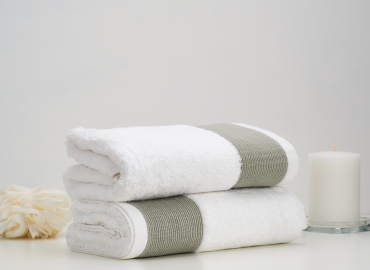What Is Bamboo Cotton?
A Comprehensive Look at One of the Textile Industry’s Most Promising Sustainable Fiber Blends — From the Perspective of Nur Nil
As sustainability becomes an increasingly critical driver in global textile manufacturing, material innovation plays a central role in shaping the future of the industry. Consumers, brands, and production partners alike are seeking solutions that strike a balance between environmental responsibility, product durability, and sensory performance. Among the most noteworthy developments in this area is bamboo cotton—a blended fabric that offers a compelling combination of comfort, functionality, and sustainability.
At Nur Nil, our mission is to deliver high-performance textiles while leading the transition toward cleaner, more responsible production. This article offers an in-depth perspective on bamboo cotton—how it is produced, its technical and ecological advantages, and its role within Nur Nil’s product development strategy.
Defining Bamboo Cotton
Bamboo cotton is a blended textile composed of natural bamboo fibers and conventional or organic cotton. This hybrid material leverages the softness, familiarity, and breathability of cotton while introducing the antibacterial, moisture-regulating, and environmentally favorable properties of bamboo.
The blend ratio typically ranges from 30% to 70% bamboo content, depending on application needs. Bamboo cotton is widely used in home textiles, luxury towels, hotel linens, baby care products, and eco-conscious apparel, offering a premium alternative to traditional fabrics.
How Bamboo Cotton Is Made
The production of bamboo cotton involves three primary stages:
1. Bamboo Cultivation and Fiber Extraction
Bamboo is an exceptionally fast-growing, renewable plant that requires no pesticides and minimal water. It regenerates naturally from its own root system, making it one of the most sustainable raw materials available in the textile sector.
The fiber is typically extracted through mechanical or chemical processing. Mechanical extraction, though less common, is the more eco-friendly option, using natural enzymes to break down the plant structure. In large-scale commercial production, a closed-loop viscose process is commonly used, where bamboo pulp is dissolved and extruded into fibers using OEKO-TEX®-compliant solvents.
2. Blending With Cotton Yarns
Once the bamboo fiber is prepared, it is spun and blended with cotton yarns. The resulting yarn benefits from the strength and structure of cotton while gaining the softness, absorbency, and antimicrobial characteristics of bamboo.
3. Weaving and Finishing
At Nur Nil, these blended yarns are woven using precision-controlled looms across our fabric and terry towel lines. Our advanced in-house dyeing and finishing processes preserve the fiber’s natural benefits while enhancing color fastness, hand-feel, and long-term durability.
Sustainability Benefits of Bamboo Cotton
Bamboo cotton is considered a material of the future due to its multi-dimensional sustainability profile:
- Reduced Water Use: Bamboo requires significantly less water than conventional cotton, alleviating pressure on local water systems.
- No Chemical Inputs: Bamboo grows without synthetic pesticides or fertilizers, reducing soil and water contamination.
- Carbon Sequestration: Bamboo forests absorb more CO₂ and release more oxygen than most tree species, contributing positively to climate regulation.
- Biodegradability: Bamboo cotton fabrics are naturally biodegradable, contributing to waste reduction at the end of the product lifecycle.
At Nur Nil, we incorporate bamboo cotton as part of our broader commitment to ISO 14001-aligned environmental management and circular material sourcing.
Key Performance Characteristics
Beyond its ecological profile, bamboo cotton also offers a series of functional and sensory advantages that are highly valued in textile applications:
- Exceptional Softness: Bamboo fibers are naturally smooth, resulting in a luxuriously soft hand-feel—ideal for high-touch items such as towels, robes, and bedding.
- Breathability and Thermal Regulation: The blend allows for superior airflow and natural cooling properties, making it ideal for hospitality linens and sleepwear.
- Antibacterial Properties: Bamboo’s natural antimicrobial agent, bamboo kun, helps reduce bacterial growth and odor retention without added chemical treatments.
- Moisture Management: Bamboo’s hollow structure enhances moisture-wicking performance, keeping the skin dry and comfortable.
- Strength and Durability: When blended with cotton, the resulting fabric benefits from excellent structural integrity and extended service life.
Nur Nil’s Bamboo Cotton Applications
At Nur Nil, we offer bamboo cotton solutions in both woven fabric and terry towel formats. Current applications include:
- Luxury hospitality towels with antibacterial and quick-dry features
- Retail bedding collections with a focus on softness and breathability
- Spa and wellness textiles that combine hygiene with elegance
- Branded private-label items for sustainability-conscious partners
Our R&D and product development teams work closely with clients to tailor bamboo cotton blends to their desired texture, weight, color range, and branding specifications. From sampling to final production, every stage is managed under strict quality controls and sustainability benchmarks.
Lead Times and Minimum Order Requirements
To maintain production efficiency and ensure quality consistency, all bamboo cotton fabric and towel orders require a minimum order of one 40-foot high cube container.
- Lead Time for Towels: 6–8 weeks from order confirmation
- Lead Time for Fabrics: 8–10 weeks from order confirmation
Our integrated supply chain and location in Egypt allow us to optimize logistics and export timelines, particularly for clients in Europe, the Middle East, and North America.
Why Choose Bamboo Cotton From Nur Nil?
Nur Nil combines deep manufacturing expertise with a forward-looking sustainability vision. Our investment in bamboo cotton reflects our broader mission to offer materials that are:
- Ethically sourced and responsibly produced
- Certified for safety and environmental compliance (OEKO-TEX®, ISO 9001, ISO 14001)
- Customizable for a wide range of industries and applications
- Scalable to meet the demands of global brands and distributors
Choosing bamboo cotton from Nur Nil is a step toward conscious consumption, product integrity, and a supply chain that respects both people and the planet.


